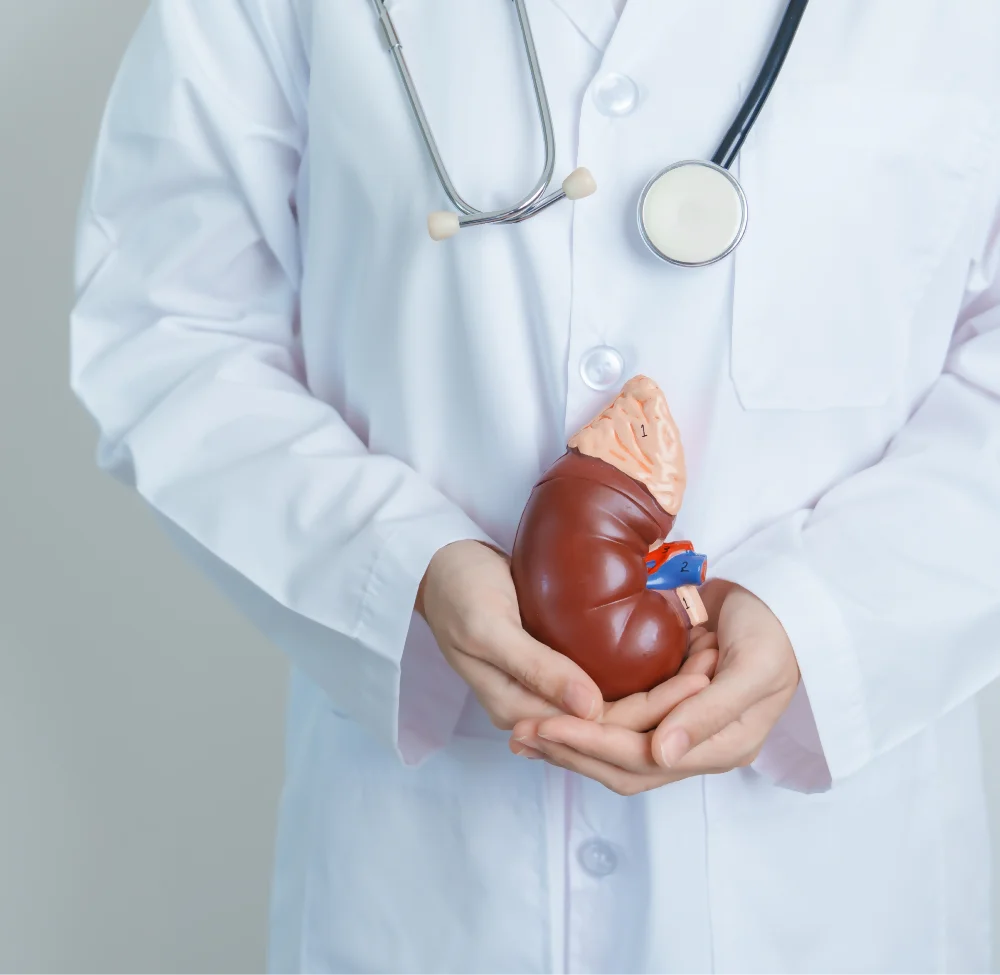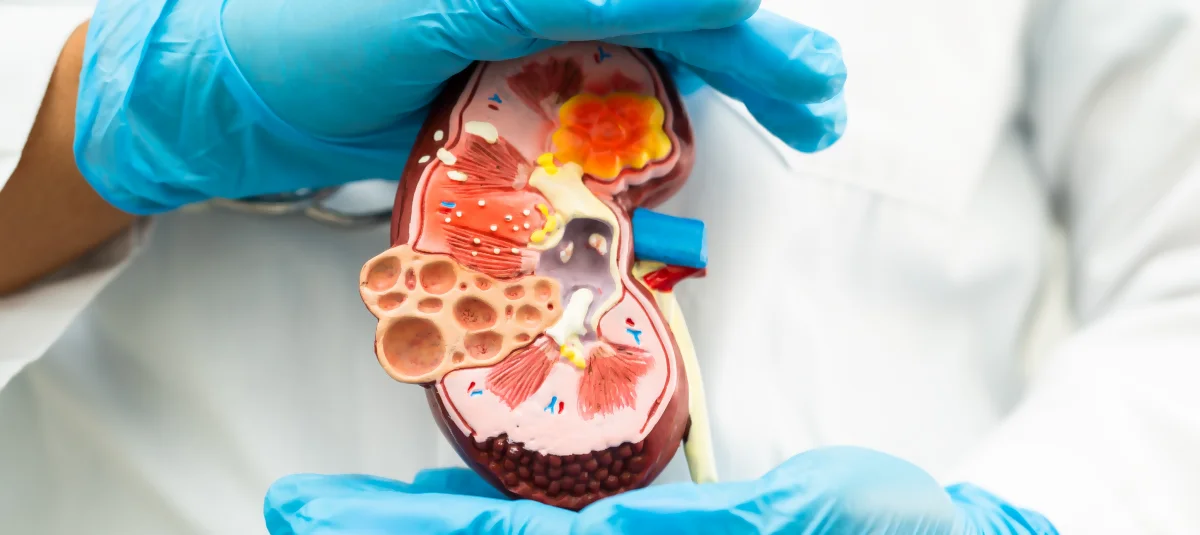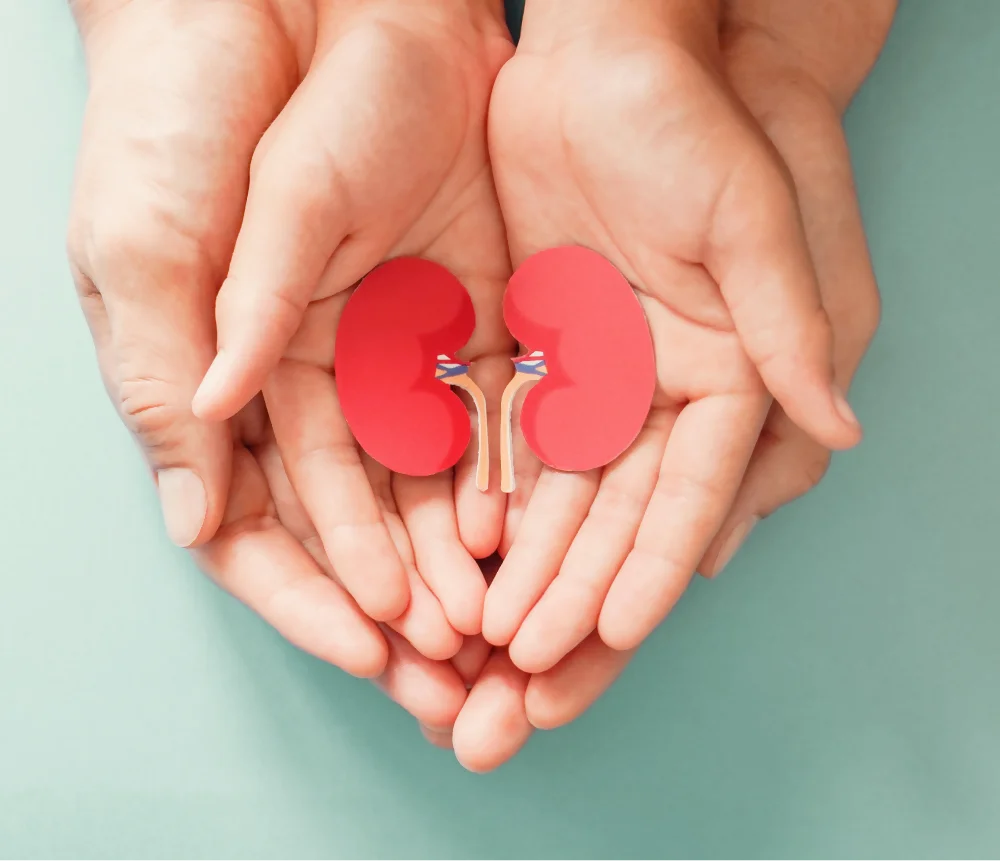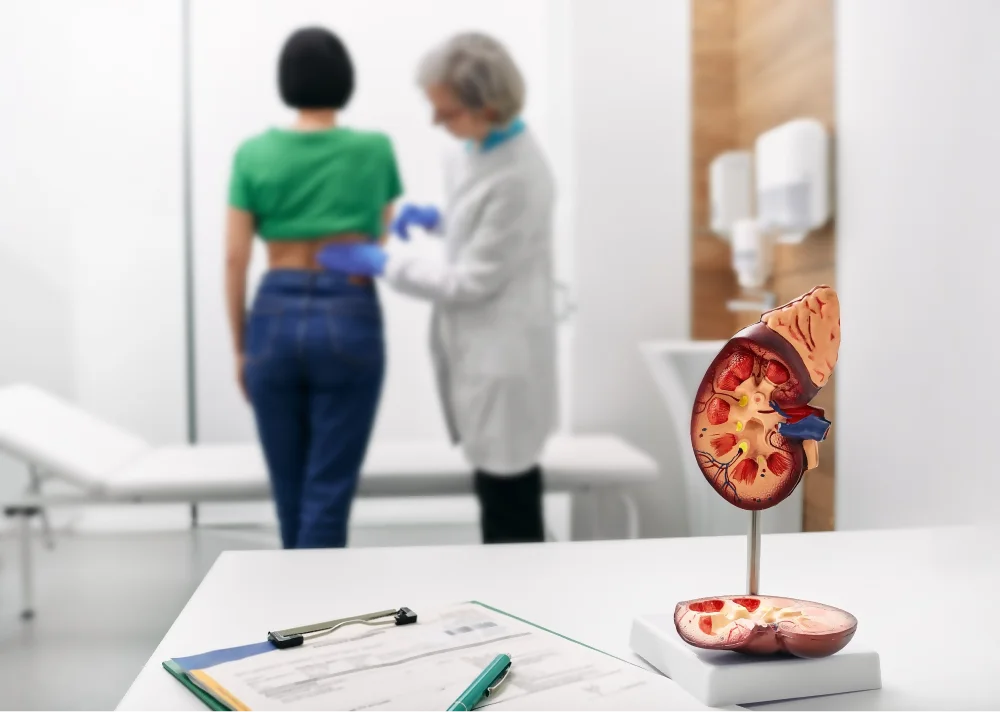Kidney Transplant
Function of the Kidneys
The kidneys, located in the back of the abdomen and shaped like beans, produce urine to remove waste and toxins while maintaining the balance of water and substances in the body. Additionally, they produce hormones that regulate blood pressure, strengthen bones, and generate red blood cells for oxygen transport in the blood.
Chronic Kidney Disease and Treatment
STAGES OF CHRONIC KIDNEY DISEASE
Chronic Kidney Disease (CKD) results from permanent and irreversible damage to kidney function, caused by various diseases such as diabetes, hypertension, and obstructive urinary tract diseases. End-stage CKD may require dialysis or a kidney transplant.
It is important to know that a kidney transplant is not an emergency; patients can live adequately with dialysis treatment while waiting for a transplant.
What is a Kidney Transplant?
A kidney transplant involves the implantation of a kidney into a patient with end-stage renal failure. Depending on the source of the organ, it is classified as either from a deceased donor or a living donor. Living donor transplants can be from related or unrelated donors, depending on their relationship to the recipient. If there is no familial relationship, a notarized statement is required to confirm that the donation is altruistic and without financial gain.

What is Needed for a Kidney Transplant?
Before your surgery, it is important to have the following:
- A list of your medications.
- Records of:
- Blood pressure readings.
- Daily temperatures.
- Oral intake.
- Urine volume.
- A family member or caregiver.
- Important phone numbers.
- Having read the Patient Education Manual.

Postoperative Care for Kidney Transplant
After the transplant, one of your main responsibilities will be to properly follow your medication regimen. Before leaving the hospital, you will receive information about your medications, including the brand name and generic name, as well as the reason for taking each one. It is crucial to adhere to a precise schedule for taking your medications, with a maximum time margin.
Treatment times vary, ranging from short periods to lifelong medications.
You should be aware of common side effects and follow any special instructions for certain medications. If you miss or delay a dose, contact your doctor for guidance. Store your medications in their original packaging, in a cool, dry place, out of reach of children and pets.
Risks of a Kidney Transplant

After a kidney transplant, various surgical and postoperative complications may arise.
- Bleeding
Bleeding is common and is usually detected within the first 12 to 24 hours, requiring surgical intervention if necessary. - Thrombosis
Vascular thrombosis is a rare but serious complication that can cause blockages in the blood vessels of the kidney. - Renal Artery Stenosis
Renal artery stenosis is a narrowing of the main blood vessel supplying blood to the kidney. This can reduce blood flow, affecting kidney function and increasing blood pressure. - Ureteral Stenosis and Urine Leakage
Sometimes the ureter, the tube that carries urine from the kidney to the bladder, may not heal properly after transplant surgery, leading to narrowing or obstructions. To prevent this complication, a ureteral catheter is used during surgery to maintain the connection while healing occurs. If you experience discomfort while urinating or sudden changes in sensation, contact your doctor immediately. - Lymphocele
During surgery, some lymphatic vessels may be cut, leading to fluid accumulation around the new kidney, known as a lymphocele. This complication affects about 10% of patients and may require drainage or surgical repair if it obstructs blood or urine flow. - Delayed Graft Function
Initial dysfunction of the transplanted kidney, involving reduced blood filtration and urine production, is common after transplant, especially in cases of deceased donor transplants, where there is a prolonged cooling period of the kidney. This dysfunction is usually reversible and may last from a few hours to weeks, though some patients may require temporary dialysis during this period. - Fever
Fever after a transplant can indicate a surgical infection or the onset of organ rejection.
- Rejection
After a kidney transplant occurs when the recipient’s immune system identifies the transplanted kidney as a foreign body and attacks it. Common symptoms include fever, changes in blood urea and creatinine levels, decreased urine output, swelling, and sudden weight gain.Hyperacute rejection occurs minutes after the transplant and can result in loss of the kidney, while acute and chronic rejection require immediate treatment to prevent permanent damage to the transplanted organ. It is important to be alert to these symptoms and seek medical attention if they occur.
- Infections
After the transplant, your immune system is weakened, increasing the risk of infections during the first three to six months, even when high levels of immunosuppressive medications are used to prevent rejection. The most common infections are caused by bacteria, fungi, and viruses. Bacterial infections usually occur early after surgery and may require antibiotic treatment.
I invite you to download our Patient Education Manual, where you will find detailed information on the necessary care to maintain your health after a kidney transplant.
Kidney Donation
Kidney donation is an altruistic act that can significantly improve another person’s quality of life. Being a living kidney donor is possible because a person can live normally with only one kidney. This decision must be voluntary, well-considered, and personal, without external pressures. It is essential to know the following information before making this important decision:

Evaluation Process
When someone wishes to donate a kidney, they initiate an evaluation process to ensure their health condition allows for donation. This process includes:
- Comprehensive Medical Evaluation: A thorough review of your overall health, including an HLA compatibility test for kidney transplantation.
- Psychological Evaluation: Ensures that you are mentally prepared and understand the implications of donation.
- Nutritional Assessment: Verifies that your nutrition and physical condition are adequate.
- Interview with a Donor Advisor: This professional will address your concerns, provide necessary support, and act as your spokesperson with the clinical team if needed.
There are certain contraindications and legal requirements that could affect the ability to donate a kidney. For additional details, we recommend downloading our patient education manual titled “What I Need to Know Before Donating My Kidney.
Recovery and Post-Donation Care

After the surgery, donors should have relative rest for four to six weeks. Subsequently, they can return to their normal activities based on their doctor’s assessment. It is crucial to maintain a balanced diet, an appropriate weight, and an exercise routine. Regular attendance at postoperative evaluations is also essential to monitor the health of the remaining kidney.
Frequently Asked Questions
Where to Find Us

Campus Observatorio
Sur 136 No. 116, Col. Las Américas, Álvaro Obregón, 01120, Cd. de México.

Campus Santa Fe
Av. Carlos Graef Fernández 154, Col. Santa Fe, Cuajimalpa, 05300, Cd. de México.


